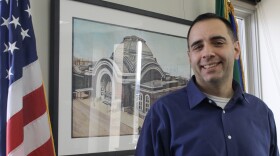Altaf Merchant, the dean of the Milgard School of Business at the University of Washington Tacoma, wanted students to learn more about financial markets. But when a student asked him if he should pay his tuition with his credit card, the question left him scratching his head.
“Credit cards are good to have but not good to use for everything. Definitely not for tuition,” Merchant said. “We are talking about financial markets, which is at such a high level, when our students need basic information.”
So, Merchant pivoted and began working on what is now the Center for Financial Wellness. The center offers financial literacy programming for students and the community and teaches strategies for wealth generation. The center's leaders believe it’s programming that could be really meaningful for students’ lives.
A 2019 survey of UW students across the system found about 20% of students are facing food and housing insecurity.
“Our students are working full time, many of them have families that they're raising,” said UW Tacoma business school administrator Kevin Dugan. “And they're going to school. So the consequences of making a [financial] mistake are very, very dire.”
This type of money management programming can help students avoid common financial pitfalls.
Hui Suk So coordinates the financial literacy workshops for the program on topics like the difference between banks and credit unions, how to buy a car, and knowing your credit score.
"Our goal is to remove the shame associated with talking about money because no matter what your experience has been previously, we want them to know that it's okay to talk about money," So said.
Fei Leng leads the other initiative for the center, teaching students how to go beyond saving and managing money and begin generating wealth and investing in stock markets.
“Money grows,” Leng said. “To make money work for them, that’s what wealth creation is about. But at the same time significant risk is involved so we still need to teach students how to manage risk and what kind of risks should and shouldn't be taken.”
The center also includes a financial wellness lab where students can learn about financial markets - a first-of-its-kind within the UW system. Merchant said he hopes the programming will change how students think and talk about money and support them beyond graduation.
“My vision is really that students find the education and knowledge that they get from us will help them manage their own life journeys better.”






